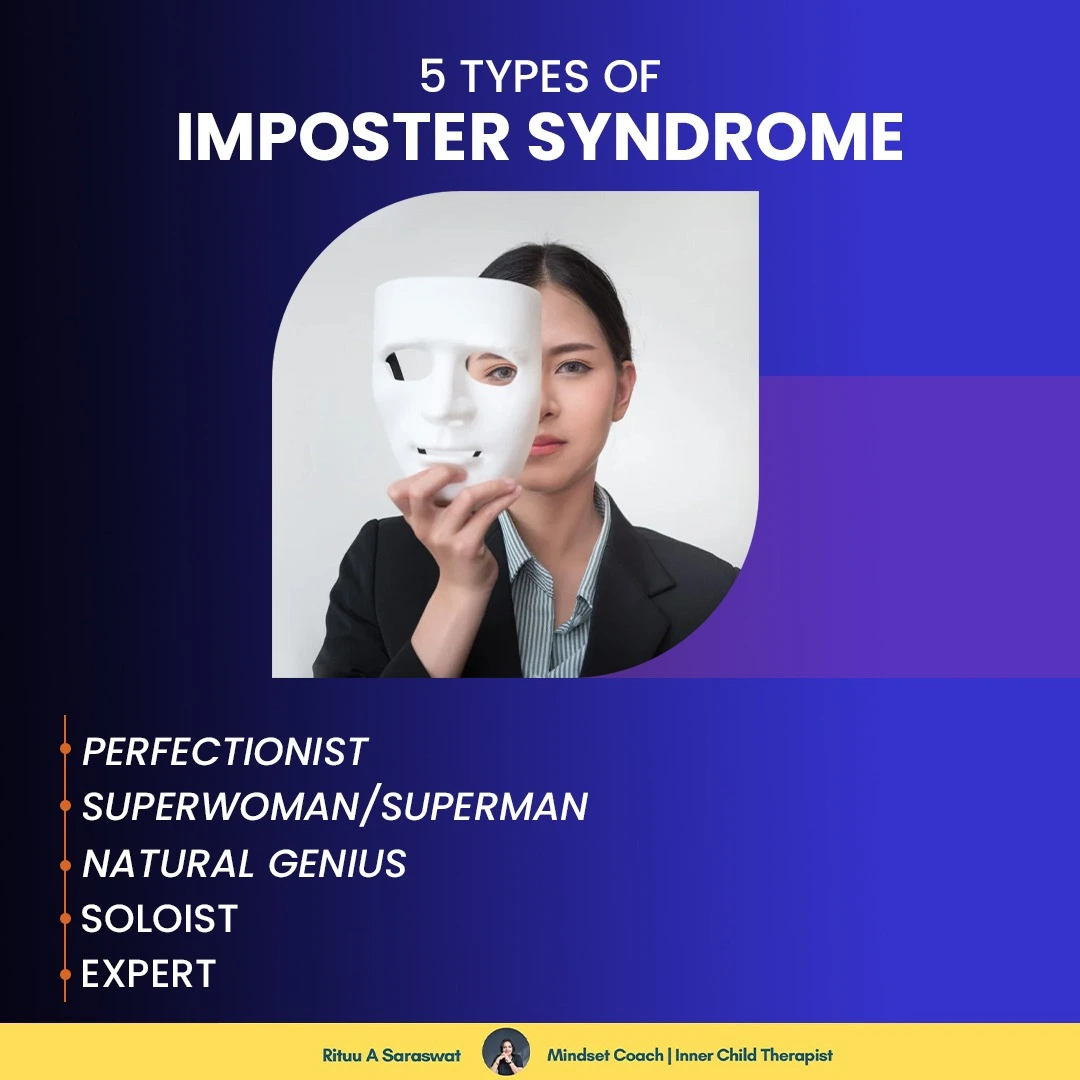
Overcoming Imposter Syndrome: Types, Root Cause, Solution
Imposter syndrome is a pervasive experience of self-doubt, despite evident success and accomplishments. Many people who struggle with this syndrome feel like frauds, constantly fearing that they will be exposed as incompetent. This persistent insecurity can stem from deep-seated childhood experiences, making it a challenge to overcome without addressing these underlying issues. Combining Life/Mindset Coaching with Inner Child Healing offers a powerful solution to this problem by targeting both the present behaviors and the root causes of imposter syndrome.
Understanding the 5 Types of Imposter Syndrome
Imposter syndrome manifests in various forms, each characterized by specific patterns of behavior and thought. Understanding these types can help individuals recognize their unique challenges and work more effectively toward overcoming them. Here are the five primary types of imposter syndrome:
- The Perfectionist
- Characteristics: Perfectionists set excessively high standards for themselves and are never satisfied with their achievements. They focus on flaws and mistakes, disregarding their successes.
- Impact on Life: This mindset can lead to overworking, burnout, and strained relationships due to unrealistic expectations.
- The Superwoman/Superman
- Characteristics: This type feels compelled to excel in every role they take on, equating competence with the ability to juggle multiple tasks perfectly.
- Impact on Life: Superwomen/Supermen often struggle with work-life balance, leading to stress, burnout, and neglect of personal relationships.
- The Natural Genius
- Characteristics: Natural geniuses believe they should master new skills effortlessly. They feel ashamed when they struggle or need to exert effort.
- Impact on Life: They may avoid challenges to prevent revealing any perceived lack of ability, which stifles personal and professional growth.
- The Soloist
- Characteristics: Soloists prefer to work alone and see asking for help as a sign of weakness.
- Impact on Life: This self-reliance can lead to inefficiency, missed opportunities, and loneliness.
- The Expert
- Characteristics: Experts feel they must know everything before taking on a task. They constantly seek new certifications and training to feel competent.
- Impact on Life: This constant quest for knowledge can lead to procrastination and prevent them from taking action, limiting career advancement.
Each of these types of imposter syndrome brings its own set of challenges that can negatively impact both professional and personal lives. Recognizing which type you resonate with is the first step toward addressing the underlying causes and moving toward a healthier self-image.
How Inner Child Healing Addresses the Root Causes of Imposter Syndrome
Imposter syndrome often originates from early childhood experiences where an individual’s self-worth and self-perception were shaped by trauma, neglect, or negative reinforcement. Inner Child Healing is a therapeutic approach that connects individuals with their inner child—the part of themselves that still carries the emotional wounds from childhood. By healing this inner child, individuals can transform their self-perception and begin to break free from the grip of imposter syndrome.
Understanding Inner Child Healing
Inner Child Healing involves recognizing and nurturing the wounded inner child. This therapy helps individuals understand how their early experiences have shaped their current beliefs and behaviors. The goal is to heal these wounds, enabling individuals to develop a healthier self-image and more positive patterns of thought and behavior.
The Role of a Trained Inner Child Therapist
A trained inner child therapist plays a crucial role in guiding individuals through this healing process. They create a safe and supportive environment for clients to explore their childhood experiences and how these experiences influence their present-day lives. The therapist’s role includes:
- Creating a Safe Space: Establishing a trusting, non-judgmental atmosphere where clients feel comfortable expressing vulnerabilities and exploring painful memories.
- Guiding Self-Exploration: Using techniques such as guided visualization, journaling, and dialogue to help clients connect with their inner child and identify the roots of their imposter syndrome.
- Facilitating Reparenting: Assisting clients in reparenting their inner child by providing the care, support, and validation that was lacking during their formative years.
- Reframing Negative Beliefs: Helping clients recognize and challenge the negative beliefs formed in childhood, replacing them with healthier, more accurate perceptions.
- Cultivating Self-Compassion: Encouraging clients to develop a nurturing and compassionate relationship with themselves, essential for long-term healing and overcoming imposter syndrome.
Key Components of Inner Child Healing
1. Identifying the Inner Child
○ Clients learn to recognize the presence of their inner child, who holds onto past experiences and emotions that continue to influence their current behavior and thought patterns.
○ Exercises such as mindfulness, visualization, and journaling bring awareness to these past experiences.
2. Reparenting the Inner Child
○ Clients offer their inner child the care, support, and validation they lacked during their formative years.
○ Practices like positive affirmations and creating a nurturing mental or physical environment help in reparenting the inner child.
3. Reframing Negative Beliefs
○ Clients identify deeply ingrained negative beliefs and understand their origins.
○ The therapist helps in challenging these beliefs and replacing them with positive self-perceptions.
4. Developing Self-Compassion
○ Clients learn to treat themselves with the same kindness and understanding they would offer a friend.
○ Techniques such as mindfulness, self-affirmation, and compassionate self-dialogue are used to cultivate self-compassion.
Combining Life/Mindset Coaching with Inner Child Healing
While Inner Child Healing addresses the root causes of imposter syndrome, Life/Mindset Coaching helps individuals implement changes in their day-to-day lives. This combination offers a holistic approach to overcoming imposter syndrome, targeting both the emotional and practical aspects of the issue.
The Role of Life/Mindset Coaching
Life/Mindset Coaching provides clients with the tools and strategies to change their thought patterns and behaviors. A coach works with clients to set realistic goals, build confidence, and develop a growth mindset. Through regular sessions, clients learn to challenge their imposter syndrome and replace self-doubt with self-belief.
● Goal Setting: Coaches help clients set achievable goals that align with their values and aspirations.
● Building Confidence: Through positive reinforcement and practical strategies, coaches assist clients in building self-confidence and resilience.
● Developing a Growth Mindset: Clients learn to view challenges as opportunities for growth, reducing the fear of failure that often accompanies imposter syndrome
Real-Life Examples of Transformation
Overcoming Perfectionism: A client struggling with perfectionism might, through a combination of Inner Child Healing and Life Coaching, learn to set more realistic standards for themselves. They may begin to recognize their achievements and let go of the need for everything to be perfect, reducing stress and improving their work-life balance.
Building Confidence in a Superwoman: A client who identifies as a Superwoman may work with a coach to delegate tasks and prioritize self-care. Simultaneously, Inner Child Healing could help them understand why they feel the need to excel in every role and begin to let go of this unrealistic expectation.
Releasing the Natural Genius’s Shame: A Natural Genius may, through therapy, come to terms with the fact that learning and growth take time. Coaching can then help them embrace challenges and take on new opportunities without fear of failure.
Conclusion: A Path to Self-Acceptance and Confidence
Combining Life/Mindset Coaching with Inner Child Healing offers a comprehensive approach to overcoming imposter syndrome. By addressing both the root causes and current behaviors, individuals can achieve lasting change, developing a stronger sense of self-worth and confidence. If you or someone you know is struggling with imposter syndrome, consider exploring these powerful therapies as a pathway to a more fulfilling, authentic life.
About the Author
Rituu Saraswat is an internationally trained Inner Child Therapist and Life Coach with over 10 years of experience. She specializes in helping individuals overcome imposter syndrome by healing their inner child and developing a growth mindset. Through her holistic approach, Rituu has empowered countless clients to break free from self-doubt and embrace their true potential.




